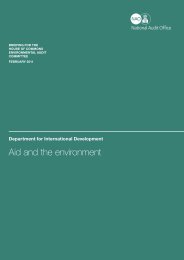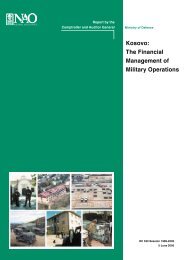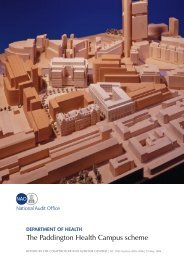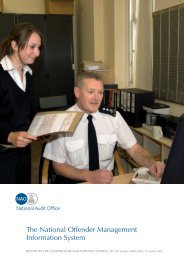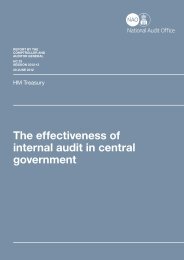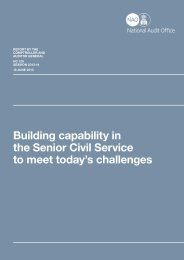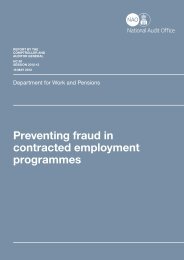Full report (pdf - 326KB) - National Audit Office
Full report (pdf - 326KB) - National Audit Office
Full report (pdf - 326KB) - National Audit Office
Create successful ePaper yourself
Turn your PDF publications into a flip-book with our unique Google optimized e-Paper software.
Reducing bureaucracy in further education in England Summary 5<br />
Summary<br />
1 The Government is reforming further education in England to deliver skills for<br />
sustainable growth. Its strategy is founded on the principles of fairness, responsibility<br />
and freedom. In terms of freedom, the Government seeks greater devolution of central<br />
control and a reduction in unnecessary bureaucracy. Since the change in government<br />
it has taken action to achieve these aims in three main areas: removing central<br />
government bodies; simplifying systems and procedures; and removing certain legal<br />
requirements on colleges.<br />
2 The Department for Business, Innovation and Skills (the Department) and the<br />
Skills Funding Agency (the Agency) provide public funding for further education for<br />
students aged 19-plus. The Department and the Agency must work in partnership with<br />
a range of other bodies that also play a key part in the sector. These are the Department<br />
for Education and the Young People’s Learning Agency, which fund education for<br />
pre‐19 year-olds, which makes up half of the total funding provided to general further<br />
education colleges, the <strong>Office</strong> of Qualifications and Examinations Regulation (Ofqual) and<br />
the <strong>Office</strong> for Standards in Education, Children’s Services and Skills (Ofsted).<br />
3 Further education has a key role in supporting economic growth, helping employers<br />
obtain the skills they need and helping learners develop a successful career. It is delivered<br />
by over 1,000 different providers, mainly further education colleges or independent training<br />
businesses. Colleges, as independent bodies, are in charge of determining the range<br />
of education they offer, allocating resources and making funding choices. They need<br />
information for their own business purposes but must also meet requirements for funding,<br />
qualification and assurance systems for government and others.<br />
4 Both the Department and the Department for Education, as funders via their<br />
agencies, need information to allocate funds, protect the public money used and ensure<br />
that funds are well managed and value for money achieved. To do this they need an<br />
effective system of monitoring and regulation. Parliament, learners and the public<br />
also need assurance that quality standards are being met. The Committee of Public<br />
Accounts’ recent <strong>report</strong>, Accountability for public money, emphasised the need for<br />
appropriate accountability for public spending. 1<br />
5 This <strong>report</strong> looks at the extent of administration carried out by providers<br />
associated with further education funding, qualification and assurance systems. Figure 5<br />
summarises some of the types of information involved. Such systems also entail costs<br />
and, if they involve unnecessary bureaucracy, will waste money. To provide value for<br />
money, such systems need to be efficient and balance benefits against the costs of the<br />
bureaucracy they impose.<br />
1 Committee of Public Accounts, Accountability for public money, HC 740 28th Report of Session 2010-12, April 2011.




